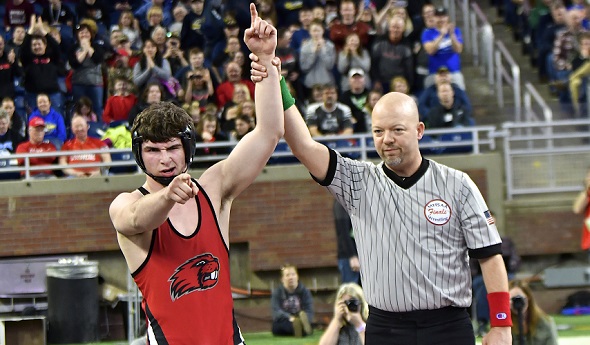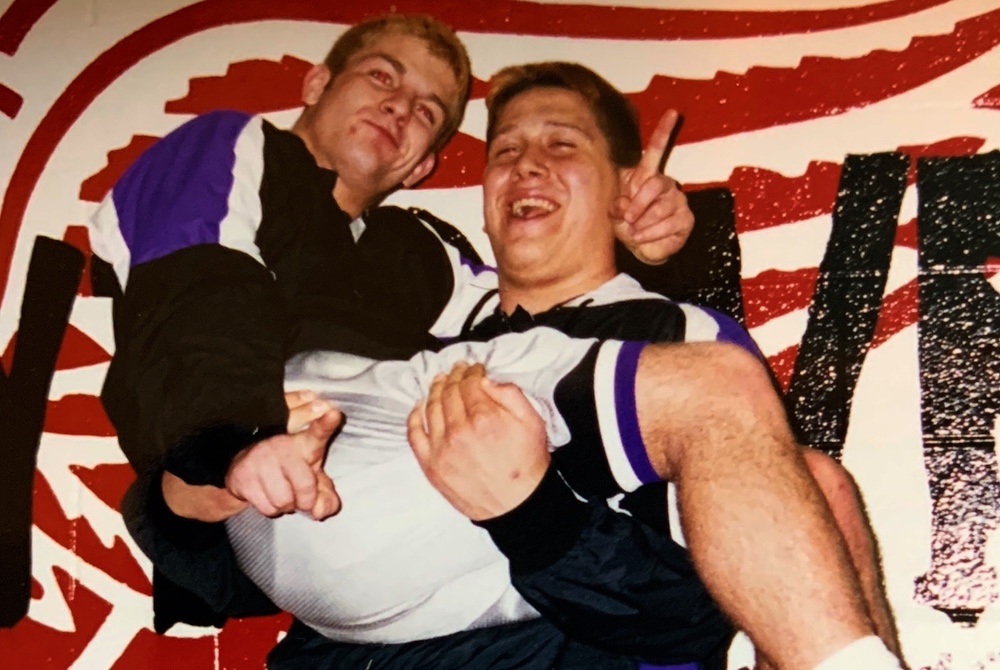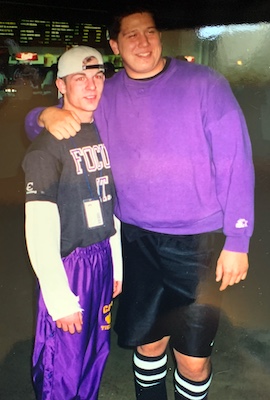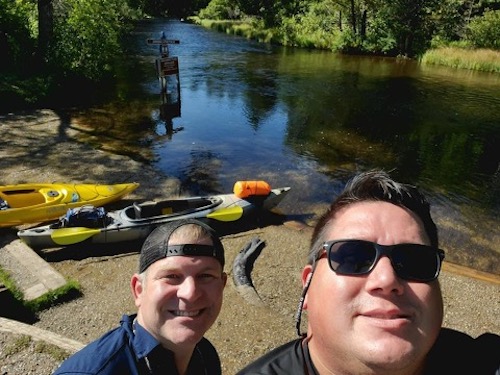
Brothers' Success Just Start for Beaverton
By
Paul Costanzo
Special for MHSAA.com
November 28, 2018
In a movie, this season and the future of the Beaverton wrestling program would be the epilogue, explained to us with words on the screen while triumphant music played.
 When Eric and Kyle Cassiday won Division 4 individual MHSAA championships in back-to-back matches last season with their father Bryan – who had started the program four years earlier – coaching matside, the script could have been completed.
When Eric and Kyle Cassiday won Division 4 individual MHSAA championships in back-to-back matches last season with their father Bryan – who had started the program four years earlier – coaching matside, the script could have been completed.
“It’s one of the top five moments of my entire life,” said Kyle Cassiday, now a senior at Beaverton. “(After my match) all I could focus on was Eric – he went through so much with injuries, so to see him win it was amazing.”
But while the Cassidays are certainly at the heart of the program, creating this program wasn’t just about them. And there are plenty more memories to be made.
“I wanted to provide an opportunity for the kids who had been through the youth program, and those that wanted to join, to at least experience what I experienced in high school wrestling,” Bryan Cassiday said. “We were all brothers, and I wanted them to get to be able to do that. We had a lot of help (from outside the program). We’ve had a lot of people helping to influence a lot of different kids. It’s been a wonderful experience.”
Bryan Cassiday is a Gladwin graduate who coached the youth program there. That included his sons Eric, Kyle and Jacob, who started when they were elementary and preschool age. Bryan continued to coach when the family moved to Beaverton, but there appeared to be a cap on how much time they could be involved with the sport and attend their new school, as Beaverton didn’t have a wrestling program.
When Eric was about to enter high school, the Cassidays started looking at options to transfer, going as far as having a family vote at the dinner table. Kyle voted for Beaverton. Little did he or his family know that was about to become an option.
“Some of the football coaches came to me and said, ‘What would it take to start a program?’” Bryan Cassiday said. “We put together some numbers on what it would cost, did some fundraising, and started one.”
For the kids, it was a relief.
“I was so happy,” Kyle said. “I didn’t want to leave my friends. They deserved to wrestle as much as we did. It was more than just for me.”
That first season, Beaverton had 12 or 13 wrestlers, Bryan Cassiday said, including a solid core of youth wrestlers who were finally able to stay at their home school, like Eric.
By Year 3 of the program, the three boys all were part of it, with Jacob as a freshman, Kyle a sophomore and Eric a junior.
Wrestling was and is a way of life for the Cassidays, who have a mat in the garage to train – or settle a dispute, even if that was rare and mostly in the past.
“It doesn’t matter what season it is, we’re always looking forward to wrestling,” said Jacob Cassiday, who was a Finals qualifier at 152 pounds a year ago. “We don’t wrestle much in the house. We broke a couple light fixtures, then that stopped.”
For Jacob, growing up as the youngest of four children (they have an older sister, Brooke, who is 21), allowed him to learn quite a bit.
 “I’ve always been the smaller one, and I’ve always had to work hard,” he said. “I never had it easy, and they never did either. I was a little pudgy, and they helped me get into shape, then helped me with getting through wrestling. They taught me how to work hard. My oldest brother Eric had probably the best motivation I’ve ever seen. He was always in the weight room or on the mat or on the football field. There was no offseason. And, of course, they taught me how to be humble, because there’s always someone out there who’s better.”
“I’ve always been the smaller one, and I’ve always had to work hard,” he said. “I never had it easy, and they never did either. I was a little pudgy, and they helped me get into shape, then helped me with getting through wrestling. They taught me how to work hard. My oldest brother Eric had probably the best motivation I’ve ever seen. He was always in the weight room or on the mat or on the football field. There was no offseason. And, of course, they taught me how to be humble, because there’s always someone out there who’s better.”
The older brothers got to see each other plenty in practice, as Kyle was at 189 pounds and Eric at 215 a year ago.
“We’re both really competitive – we love to win, it’s what we strive to do,” Kyle said. “Halfway through the year, we started to change our perspective and realized we had a chance at winning. We would point each other to different techniques. Sometimes it got pretty intense, and we’d get pretty heated.”
Brotherly tensions aren’t something Dad worries much about spilling over, though.
“Really very rarely did they ever have problems,” Bryan said. “There was a point in the season when I was trying to get everybody on edge a little bit, and there were a couple times I had to separate them, but nothing out of control; you could just tell they were wanting it. Generally speaking, to be very honest, I’ve seen siblings that argue and fight – my kids don’t do that. They hunt together, they wrestle together, they do pretty much everything together.”
They eventually won Division 4 titles together. At last winter’s Finals at Ford Field, Kyle defeated TJ Rizor of Leroy Pine River 8-1 in the 189-pound final, while Eric followed with a 4-0 win against Chase Gibson of Bronson at 215.
“There will never be a way, honestly, to describe what happened,” Bryan said. “I couldn’t talk. I was having a hard time coping with it, to be honest with you. It’s hard to become a state champion. It was the culmination of the years and years of hard work and the passion they put into it. They continued to work, and they got paid in the end.”
Kyle said his championship wouldn’t have meant nearly as much had his brother not won. It’s something they’ll be able to talk about when they’re 40, he said.
But there’s more work to do for all of the Cassidays and the program as a whole. Eric, who is now a freshman at Saginaw Valley State University, comes back home to help his dad coach. Kyle is looking to repeat as a Finals champ, and Jacob wants to take the next step at Ford Field and make his way onto the podium.
The program itself has more building to do, but it does have a solid core heading into this year as Cameron Austin and Jack Owens (fifth last season at 171) join the younger Cassidays as returning Finals qualifiers. For now, the top priority, Bryan Cassiday said, is improving every day.
In just four years, Beaverton wrestling has started to make a name for itself. Growing that name, Kyle Cassiday said, would be an even greater accomplishment that the incredible end to last season.
“I’d be more proud of building a successful program than a championship because it’s an end result,” he said. “It will be creating something for more than just me. It would be for a lot of different people.”
 Paul Costanzo served as a sportswriter at The Port Huron Times Herald from 2006-15, including three years as lead sportswriter, and prior to that as sports editor at the Hillsdale Daily News from 2005-06. He can be reached at [email protected] with story ideas for Genesee, Lapeer, St. Clair, Sanilac, Huron, Tuscola, Saginaw, Bay, Arenac, Midland and Gladwin counties.
Paul Costanzo served as a sportswriter at The Port Huron Times Herald from 2006-15, including three years as lead sportswriter, and prior to that as sports editor at the Hillsdale Daily News from 2005-06. He can be reached at [email protected] with story ideas for Genesee, Lapeer, St. Clair, Sanilac, Huron, Tuscola, Saginaw, Bay, Arenac, Midland and Gladwin counties.
PHOTOS: (Top) Kyle Cassiday celebrates as he’s signaled the winner of last season’s Division 4 championship match at 189 pounds. (Middle) Eric and Kyle Cassiday share an embrace after Eric followed up with the win at 215 at Ford Field. (Click to see more from HighSchoolSportsScene.com.)

Caro Champs Find Common Ground Again as Mental Health Providers
By
Paul Costanzo
Special for MHSAA.com
July 8, 2021
Phil Millerov and Phil Niklowicz wanted to do more than simply defeat opponents when wrestling at Caro High School.
They wanted to dominate – physically and mentally.
 “We had this thing between us where we wanted to be done, and (opponents) didn’t want to come back on the mat with us,” Millerov said.
“We had this thing between us where we wanted to be done, and (opponents) didn’t want to come back on the mat with us,” Millerov said.
Twenty years later, both spend their days building people up. Millerov is a licensed professional counselor, while Niklowicz is a licensed therapist.
“I went out there looking to dominate and make sure it was known that I am the superior wrestler in all facets,” Niklowicz said. “I would try to run up as many points as fast as I can. I would teach the same thing when coaching, specifically with my nephew. You’re saying, ‘Listen, we want to break these people.’ Then the next day, in a therapy session, it’s like, ‘Let’s build up your self-esteem and set some goals to boost ourselves up.’”
The close friends and two faces of Caro’s surging wrestling program in the late 1990s now have very similar careers. Millerov – who finished second, third and first at 275 pounds in the 1998, 1999 and 2000 MHSAA Finals, respectively -- works in private practice at Transitions Counseling Service in Greenville, where he specializes in substance abuse disorders. He also has served as a Class 1 Fellow at the WK Kellogg Foundation.
Niklowicz – a two-time MHSAA Finals champion (1999 and 2000) and four-time placer – is working in private practice in Southfield, seeing mostly children. He also works in adult foster care with patients who have had traumatic brain injuries.
“He and I went and hiked Pictured Rocks at the beginning of May,” Millerov said. “And we joked about how nobody would have guessed that we’d be doing this now.”
That Millerov and Niklowicz are still close does not come as a surprise. Their friendship began when their wrestling careers did, as 6-year-olds in the Caro Growlers program. As they were becoming two of the state’s top wrestlers, they would share rides to tournaments, and their families grew close.
In high school, despite their size difference – Niklowicz wrestled at 135 his senior year – it wasn’t uncommon to see them warming up together.
“We were definitely easy going and liked to mess around a lot,” Niklowicz said. “We used to mess around before meets and throw each other. He would jump and I would throw him. People would look at us like, ‘Why is that little guy throwing that big guy?’”
 While their teams never made it out of the Regional, Millerov and Niklowicz helped set the stage for a program that would become among the best in Division 3 throughout the 2000s, qualifying for five straight Quarterfinals from 2003-07 and winning the Division 3 Finals title in 2003.
While their teams never made it out of the Regional, Millerov and Niklowicz helped set the stage for a program that would become among the best in Division 3 throughout the 2000s, qualifying for five straight Quarterfinals from 2003-07 and winning the Division 3 Finals title in 2003.
Individually, they were among the most well-known and feared wrestlers in the state.
“Niklowicz and I were fortunate to have each other, because we pushed each other,” Millerov said. “We were in constant competition with each other and ourselves. Just to kind of push each other, it was a great thing.”
Niklowicz finished fifth as a freshman and third as a sophomore before winning back-to-back titles to close out his career. In 1999, he defeated Nick Oertel of Goodrich 9-2 in the 125-pound final, and the next year he defeated Oertel’s teammate, Ryan Tripp, 7-5 at 135. Tripp would go on to win an individual title the following year. Niklowicz would finish his career with 214 victories.
“I think probably both (Finals titles) were equal,” Niklowicz said. “I think there was probably a little more stress going into my senior year. My motivation always came from improving, then it was maintaining the state title. You don’t want to go the opposite direction.”
Millerov lost a tight 6-4 decision against Remus Chippewa Hills’ Bob Kozlowski in the MHSAA Finals as a sophomore, and had an epic 12-10 match against future NFL defensive lineman Jason Babin of Paw Paw in the 1999 semifinals before fighting back to take third. The next year, he won his title via first-period pin against Dan Kliphuis, a two-time runner-up from Grand Rapids West Catholic. Millerov finished with 196 career wins and set the state record for pins in a career (160), which was broken the next season by Nick Simmons of Williamston and is now held by Justin Zeerip of Hesperia. The 56 pins Millerov recorded his senior season remains second all-time to Simmons, who had two seasons with 57.
“I never really thought about (the pin record) to be quite honest,” Millerov said. “It was just kind of in the background. It didn’t matter; all I cared about was winning this match, and I wanted to do it in the most effective, efficient way I could.”
They both continued their wrestling careers, but went their separate ways in college, with Millerov heading to Neosho County Community College in Kansas and Niklowicz to Virginia Tech.
Millerov had interest from several Division I schools coming out of high school, including some in the Big Ten, but he admits his grades weren’t good enough at the time. Neosho provided a chance to compete with some of the best in the country while at the junior college level, however, as the team took second at the National Junior College Athletic Association championships in 2002.
He transferred to Central Michigan after his sophomore year, joining his girlfriend – now his wife – who was already attending, and walking onto the wrestling team. While his relationship lasted, wrestling did not.
“I was distracted,” Millerov said. “My grandmother passed away in 2002 in that summer. I was trying to get that motivation back, and I just lost it. There has to be that edge with wrestling. When things didn’t work out, I struggled. Wrestling was my identity.”
Millerov was working to follow in his father’s footsteps and become a police officer. But the elder Phil Millerov, who died in 2012, talked his son out of it.
“Looking back on it, for me, it was obviously the right decision,” Millerov said.
The idea to go into counseling came after Millerov was married in 2006, as his wife had gotten into the program. He went back to school to earn his bachelor’s degree from CMU in 2007, and would go on to get his master’s from CMU, as well.
“I had taken a bunch of psychology courses just because I liked the field,” Millerov said. “I liked to be challenged. I liked puzzles, and with psychology, it’s like a new puzzle every hour. It just clicked. I flew through and graduated with like a 3.8. I was like, ‘Wow, I kind of feel smart.’ It was good to find something I was passionate about again.”
Millerov said he’s constantly learning and honing his craft, much like he did as a wrestler. A major difference now, however, is that he’s found more balance in his life.
“I think about working with athletes in addiction, I find a lot of similarities,” he said. “Wrestling was my life, it’s how I identified myself. I hear that same kind of talk around people struggling with addiction. One you’re considered successful for, the other you’re not. Most of my growth has been around finding balance. I find that my happiness and my clients’ as well, is when we found that balance instead of being good at just one thing. I want you to have passion, I want you to do things you love, but I also want you to be effective as a husband, a father, whatever other responsibilities you have.”
 Niklowicz’s journey to becoming a therapist was more telegraphed, as both of his parents work in mental health, and he said it was always something he wanted to do, as well.
Niklowicz’s journey to becoming a therapist was more telegraphed, as both of his parents work in mental health, and he said it was always something he wanted to do, as well.
He attended Virginia Tech on a wrestling scholarship, but transferred to Eastern Michigan after one year. The Hokies had recruited him to wrestle at 133 pounds, but when the team’s 125-pounder was injured, Niklowicz was asked to cut down further. Like Millerov, he struggled when his wrestling career ended.
“I just had a really bad taste in my mouth after leaving Virginia Tech and trying to cut all this weight,” he said. “Some of it was I had lost the desire to work out, to wrestle. Fifteen years, roughly, of my life was dedicated to wrestling, and once you stop, what do I do with my winters? What do I do with seven months of the year? It was definitely a part of my identity; that’s why I got into coaching. I did MMA fighting for a little bit to have something competitive.”
Like Millerov, Niklowicz said finding balance was important.
“In the mental health field, specifically, there’s a lot of burnout for people,” he said. “Every day, you’re listening to people talking about their problems, but at the same time, they’re coming for a reason and they’re there for help, so you have to provide that help and have to motivate yourself to come to the office every day and give it your best. I try to instill the motivation that I used to other people.”
When Niklowicz looks at his time as an athlete compared to his work as a therapist, he said that work ethic is the main characteristic that has carried over.
“I think my practice mentality was the same as it was on the mat,” he said. “Even in the wrestling room, these are people I’m friends with, people I grew up with, and I still didn’t want anyone to score on me. Then you just look at your work ethic outside of wrestling, whether you’re studying for exams or motivating yourself to get up and go to class.”
While they are no longer living in the same town or living similar lives – Millerov is married with three kids, while Niklowicz is single – the connection between Caro’s dominant duo remains strong, both professionally and personally.
“I don’t think we ever thought we would be going down such a similar path, and I doubt that either one of us grew up thinking we would do the exact same thing,” Niklowicz said. “We met when we were 6 years old, and we’ve been best friends forever. I think it’s hilarious that we’ve taken such similar paths but with some glaring differences. It’s definitely interesting that we’re still really good friends after 30-some years, especially since we’ve moved on and gone our separate ways.”
2020-21 Made in Michigan
June 28: Michigan's Minor Leaguers Making Up for Lost Season - Read
PHOTOS: (Top) Caro’s Phil Millerov lifts teammate Phil Niklowicz as both celebrate Division 3 championships during the 2000 Individual Finals at Joe Louis Arena. (Middle) Niklowicz, left, and Millerov were high school warm-up partners despite wrestling at significantly different weights. (Below) Niklowicz and Millerov take a selfie during a hiking trip to Pictured Rocks National Lakeshore in May. (Photos courtesy of Niklowicz and Millerov.)

